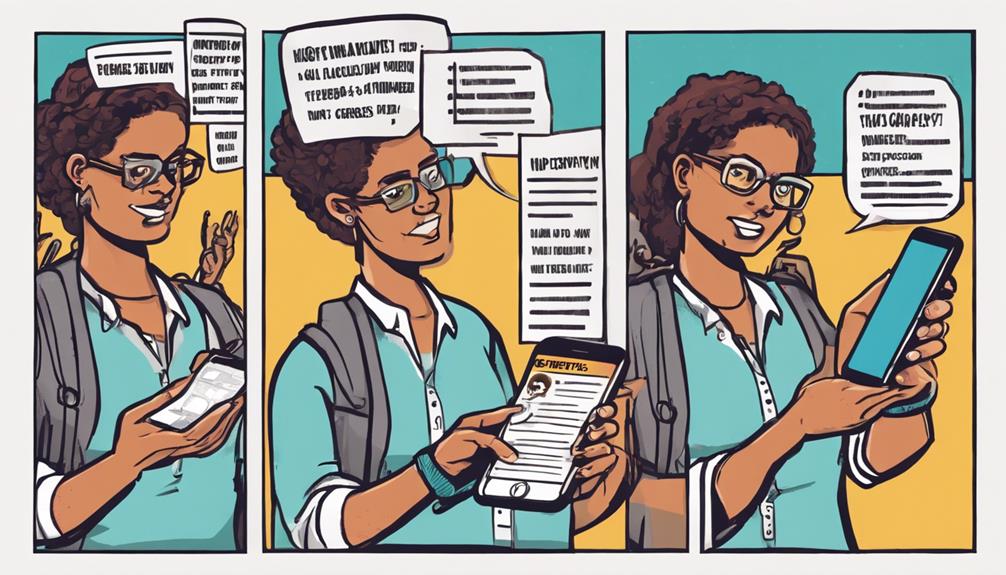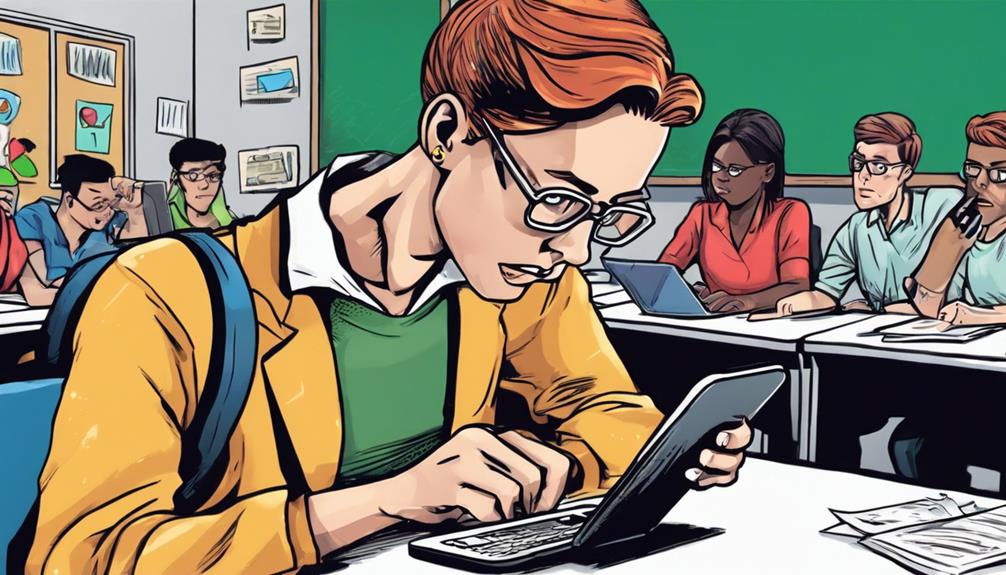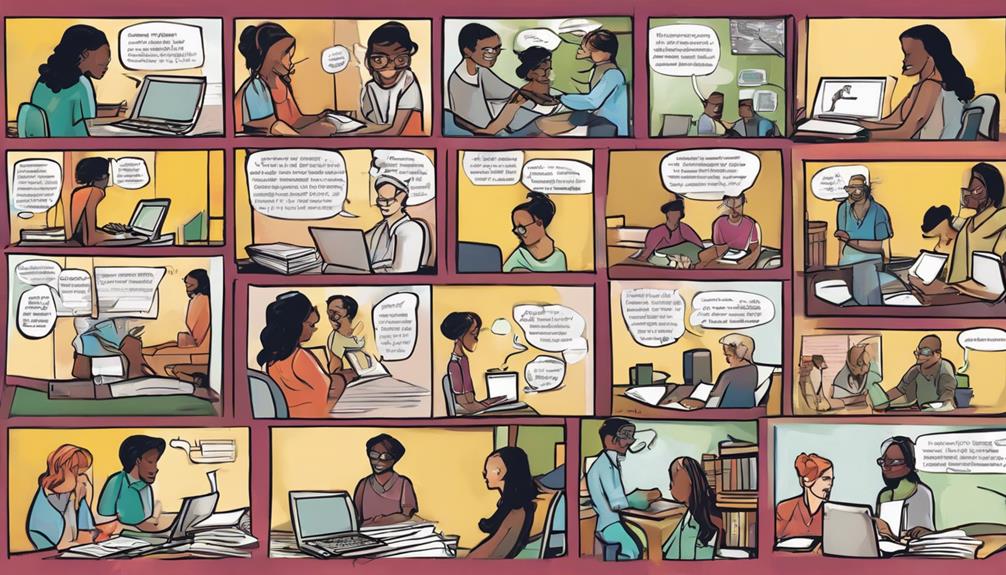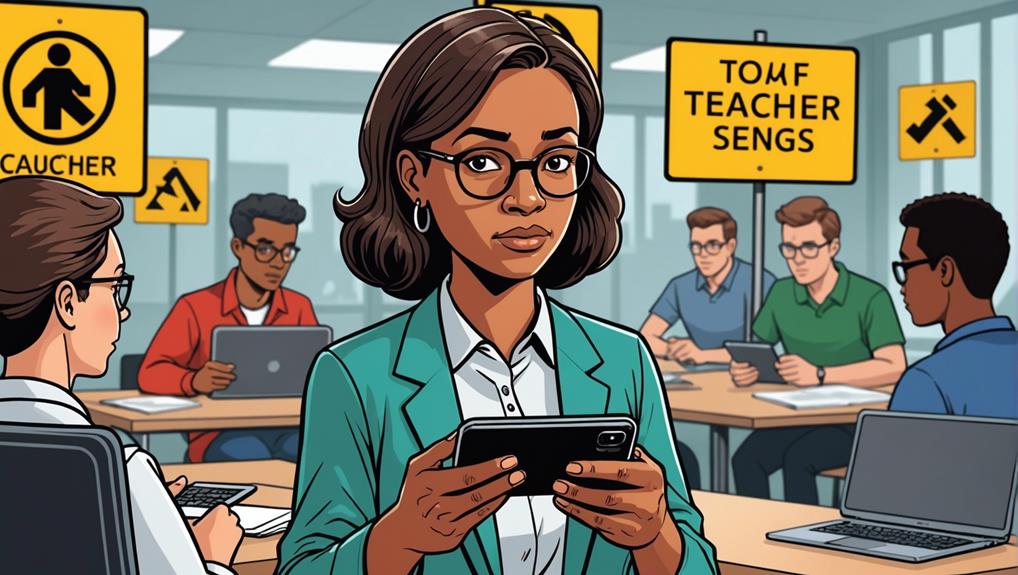Hey there, educators! Exploring social media waters? Here are top tips:
- Guidelines for Posts: Avoid unsavory content for professional integrity.
- Interactions Etiquette: Stay professional, reply promptly, and mind your privacy settings.
- Maintaining Pro Image: Separate personal from professional accounts for good vibes.
- Student Privacy: Get consent before sharing and scrub after use.
- Online Communities: Connect to grow, learn, and network!
Remember, your digital track matters! Make the grade with these cautionary steps.
Key Takeaways
- Separate personal and professional accounts to maintain professionalism.
- Obtain explicit consent before sharing student-related content online.
- Review and delete any past inappropriate social media posts.
- Respond promptly and professionally to online communications.
- Uphold ethical standards and student privacy in online interactions.

Dual Social Media Crystal Stand with NFC & QR Code – Compatible with Google Review Page & Official Websites, Boost Business Reviews & Social Media Following, No App, No Subscription, Lifetime Promotional Desktop Decor for Business
✅ Zero App Required – Effortless for Everyone! Both setup and use require NO downloadable app! As a…
As an affiliate, we earn on qualifying purchases.
As an affiliate, we earn on qualifying purchases.
Guidelines for Social Media Posts

Adhering to appropriate guidelines for social media posts is crucial for educators to safeguard their professional reputation and uphold ethical standards in the digital age.
Teachers must steer clear of sharing content that includes foul language, inappropriate behavior, or attire that could compromise their standing.
The repercussions of posting unsuitable material can be severe, potentially leading to professional consequences.
It is advisable to review and delete any previous social media posts that may be considered inappropriate to prevent any misunderstandings.

The Social Media Gospel: Sharing the Good News in New Ways, Second Edition
As an affiliate, we earn on qualifying purchases.
As an affiliate, we earn on qualifying purchases.
Interactions and Communication Etiquette

Ensuring appropriate interactions and communication etiquette on social media is essential for educators to maintain professionalism and uphold boundaries.
- Maintain a Professional Tone:
Always use respectful language and a professional tone when communicating with colleagues or parents online.
- Respond Promptly:
Timely responses to messages and comments show that you value and respect the individual reaching out to you.
- Mind Your Privacy Settings:
Regularly review and update your privacy settings to control who can see your posts and information.
- Avoid Controversial Topics:
Refrain from engaging in controversial discussions or sharing polarizing opinions that could reflect poorly on your professional image.

The Educator's Guide to Grants
As an affiliate, we earn on qualifying purchases.
As an affiliate, we earn on qualifying purchases.
Maintaining Professionalism Online

- Upholding a professional demeanor on social media platforms is imperative for educators to safeguard their reputations and maintain ethical standards in the digital domain. To assist in navigating this digital landscape, a table is provided below highlighting key strategies for maintaining professionalism online:
| Professionalism on Social Media | Tips |
|---|---|
| Create professional accounts | Establish separate accounts for personal and professional use. |
| Monitor content | Regularly review posts and interactions to guarantee they align with professional standards. |
| Engage respectfully | Interact with colleagues and educational communities in a courteous and respectful manner. |
| Seek feedback | Request feedback from trusted colleagues on your online presence and adjust as needed. |
student privacy consent forms for social media
As an affiliate, we earn on qualifying purchases.
As an affiliate, we earn on qualifying purchases.
Ensuring Student Privacy and Consent

To uphold ethical standards in online interactions involving students, it is imperative for educators to prioritize student privacy and obtain proper consent before sharing any student-related content on social media platforms.
When it comes to ensuring student privacy and consent, educators can follow these essential steps:
- Obtain explicit permission before sharing any pictures or information about students online.
- Share student-related content only through official school channels with proper authorization.
- Respect students' privacy by promptly deleting any shared content after it has served its purpose.
- Always refrain from posting pictures or information about students without obtaining their or their guardians' consent.
Engaging in Online Communities

How can teachers effectively engage in online communities to enhance their professional networking and access valuable educational resources?
Engaging in online communities allows educators to connect with like-minded professionals, share ideas, and stay updated on the latest trends in education.
By joining platforms such as Twitter chats, Facebook groups, or educational forums, teachers can collaborate, learn from others, and discover new teaching strategies.
Online communities provide a space for lively discussions, resource sharing, and mutual support among educators worldwide.
Through active participation in these communities, teachers can expand their knowledge, gain fresh perspectives, and build a strong professional network.
Embracing online communities can lead to continuous growth and development in the field of education.
Frequently Asked Questions
Can Teachers Use Social Media to Connect With Former Students?
Teachers should exercise caution when using social media to connect with former students. Boundaries should be maintained to uphold professionalism and avoid potential misunderstandings. Prioritize privacy and make sure interactions remain appropriate and respectful.
Is It Acceptable to Share Educational Materials on Personal Accounts?
Promoting pedagogy on personal platforms can be perilous. Proficiently prioritize professionalism by using professional channels for educational sharing. Pertinent permissions and privacy practices must be in place to prevent potential pitfalls and protect students.
Should Teachers Engage in Controversial Discussions on Social Media?
Engaging in controversial discussions on social media can impact a teacher's professional reputation and relationships. Caution is advised, as opinions may be misconstrued, leading to conflicts or inappropriate behavior. Upholding professionalism is essential.
How Can Teachers Handle Negative Comments or Feedback on Social Media?
When faced with negative comments or feedback on social media, teachers should respond calmly and professionally, addressing concerns with empathy and understanding. Engage respectfully, consider constructive criticism, and use the opportunity for growth.
Can Teachers Collaborate With Parents on Social Media for Educational Purposes?
Collaborating with parents on social media for educational purposes can enhance communication and engagement. Utilize official school channels for interactions to guarantee privacy and professionalism. Obtain consent before sharing student-related content to maintain ethical standards.
Conclusion
To wrap up, teachers must approach social media with caution and professionalism to protect their reputation and maintain positive relationships with students, parents, and colleagues. By following guidelines for appropriate content posting, communication etiquette, professionalism, student privacy, and engaging in online communities, educators can create a safe and constructive online environment.
Remember, a teacher's online presence reflects their integrity and dedication to their profession, so it's crucial to navigate social media with care and responsibility.









